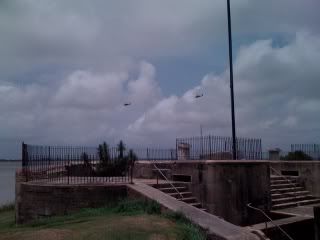Regular readers may have noticed that I'm rather late posting today. This is because I have divided today between chasing my grandson and writing an Op-Ed article about my oil spill adventure for submission to the New York Times. Who knows what my chances of being published there are, but they are zero if I do not try. And just so you know how completely distracting my charming grandson is, here's a photo of the two of us together.
It was taken a few months ago, but it is impossible to show you one made today, because I am suffering from a bout of laryngitis, and I look as terrible as I feel. And let me tell you, when a woman as hyperverbal as me gets laryngitis, she is indeed miserable.
You may be wondering why it took hyperverbal me all day to write an article for the New York Times when I toss these pearls of wisdom in your direction daily. Well, the Times has this flippin' word limit. I was forced to say all I wanted to say about the oil spill in 750 words. First of all, it takes me 750 words to clear my throat and get started. (I can hear you all shouting in unison, "We noticed!") And second of all, the whole point of my article is how flippin' huge this devastation is. How am I supposed to tell a huge story in so few words? But I am a professional, and I just flung a finely honed piece of prose consisting of 750 well-chosen words in the general direction of Manhattan. They have a three-day response time. If they publish the piece, you people will be the first to know.
Now, where was I? I had just told you about arriving at the palatial fishing camp that would serve as my home base while in south Louisiana, and you were all feeling jealous that my cousin Cheryl and I got to sit in the hot tub and drink beer and watch the sun set. So let's take the story back up early on Saturday, as we left to drive south.
First, you must know that the countryside is utterly flat. The difference between water and land is sometimes a mere matter of opinion. If a person digs a ditch, he creates a canal. If he takes the dirt from that ditch and piles it alongside, he creates something that looks to the Louisianan like dry land, so he thinks he might well build a house on it...and it will be a canalfront house, which is a wonderful thing in this place where everybody loves to fish.
As we drove south on Plaquemines Highway, the land on either side of us was always low-lying and it was often swampy. The Mississippi River was to our left, and various bays and waterways that are attached to the Gulf were on our right. Waterfronts in both directions are protected by levees, so there was almost always at least one levee within sight. Often those protective piles of dirt rose above us in both directions, a visual reminder that we were following a narrow spit of land as far out to sea as it would take us.
I had spotted Fort Jackson on the map, and it was marked as a historical site, so I figured it was more than just a campsite named after a long-gone fort. It was well-marked, so we had no trouble finding the beautifully constructed old (1822!) masonry building. Unfortunately, it was closed, probably in the wake of Katrina, but we could drive along the access road between the fort and the river. We parked there and got out to explore the area that wasn't closed. Up on the levee was an observation point with a wonderful view of the river and the fort, and of a bayou across the river known as Mardi Gras Bayou that is said to have the oldest place name (1699!) in the Mississippi Valley.
This little tour would have been exactly as I expected it to be, except for the constant thwapping of helicopter blades. Some sort of relief effort was being conducted from the fort property, and many helicopters were taking off in quick succession. They were dangling cables loaded with...something. Dispersant? Cameras? Cheryl and I could hardly contain our curiosity.
We didn't feel comfortable striding into that busy makeshift heliport, so we approached two gentlemen walking across the parking lot. They were wearing protective jumpsuits and had just disembarked from a helicopter that didn't seem to be associated with the others. It turned out that they were with the Fish and Wildlife Commission, and they'd been out doing reconnaissance. They'd come in to deliver an oiled pelican to someone who could help. We asked if they'd seen the spill. They said, yes, and that it was bad. They gestured across the highway and said "It's about fifteen miles over there."
Now the twisty river makes the geography of that area mindbendingly difficult to grasp, but I know one thing. Fifteen miles isn't as far as I'd like it to be. We were well above the end of the road at Venice, and Venice is a long way from the river outlets. I did not like hearing that the oil had come up so far.
The two workers needed to go get some lunch, so we didn't keep them, but we did ask if they knew what the helicopters at Fort Jackson were carrying. "Sandbags," they said. "To fill the gaps between some of the barrier islands."
Now, sand is heavy. The sandbags that those big helicopters were able to carry were relatively small. How many trips will it take to move an appreciable amount of sand by air? Nevertheless, those pilots were giving it a good try. Helicopters came and went so rapidly that the whole area sounded like a war zone.
Here's one of the choppers flying over the old fort. You can see the sandbag cable dangling.
And here are some other helicopters, flying over the fort's riverside lookout post, heading off on a mission that doesn't seem to involve sandbags. They were heading across the river, while the sandbag activities seemed to be west of us. I'm thinking they were doing reconnaissance.
When we left Fort Jackson, we headed to the end of the road in Venice. There, we saw a command post sending many workers out into the spill zone. When we got back to the house where we were staying, we were surprised to see another command post at the marina there. Again, workers arrived by the busload, and a flotilla of boats loaded with passengers were heading out.
Two things crossed my mind. First, all that effort is just not enough. Huge efforts by lots of people will help the situation, but the affected area is unimaginably vast. And second, I was disconcerted to see so much work being done so far north.
We had plans the next day to take a boat out to see the spill. The presence of these workers made me think we wouldn't need to travel nearly as far as I would like.
Until tomorrow--
Mary Anna
Sometimes you really don't want to know how books are made.
Wednesday, June 9, 2010
Subscribe to:
Post Comments (Atom)
About Me

- Mary Anna Evans
- Mary Anna Evans has degrees in physics and engineering, but her heart is in the past. Her series character, Faye Longchamp, lives the exciting life of an archaeologist, and Mary Anna envies her a little. Faye Longchamp's growing list of adventures include Artifacts, Relics, Effigies, Findings, Floodgates and, coming in October, Strangers. Mary Anna is a co-founder and board member of the Anhinga Writers' Studio. The Studio presents an annual summer workshop in Gainesville, Florida, providing writing instruction and networking for fiction and nonfiction authors of all levels of experience. For information on this year's summer workshop, visit www.anhingawriters.org.
Followers
Blog Archive
-
▼
2010
(124)
-
▼
June
(21)
- Writing Tips for the Practical-Minded #6: Take ca...
- Writing Tips for the Practical-Minded #5: Verbs R...
- Writing Tips for the Practical-Minded #4: The Lov...
- Writing Tips for the Practical-Minded #3: I know ...
- Writing Tips for the Practical-Minded #2: Know wh...
- Thirty days, thirty pearls of writing wisdom...
- Why is there a ladder in my kitchen?
- First review of STRANGERS :)
- A Very Timely Tome
- Elegance at Galatoire's
- A Most Pleasant Way To Do The Right Thing
- Making sausage in another locale...
- A Matter of Perspective: A Novel-writing Engineer...
- More sausage, coming your way...
- The Oil Spill Story, All in One Place
- Trip to the Oil Spill, Part III--Oil, as far as th...
- Just a little housekeeping...
- A Novelist/Engineer's Perspective on the Oil Spill...
- Eyewitness to the oil spill
- I'm serious about my research
- A Tale of Titles, Part Quattuor
-
▼
June
(21)

















Oh, those poor people in that community! To have the constant buzz of helicopters working at a Sisyphean task. What a terrible thing all around.
ReplyDelete